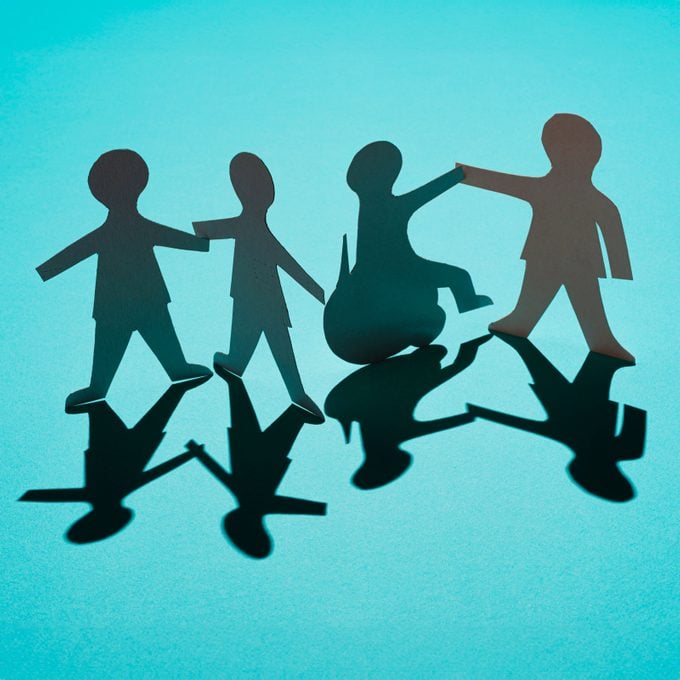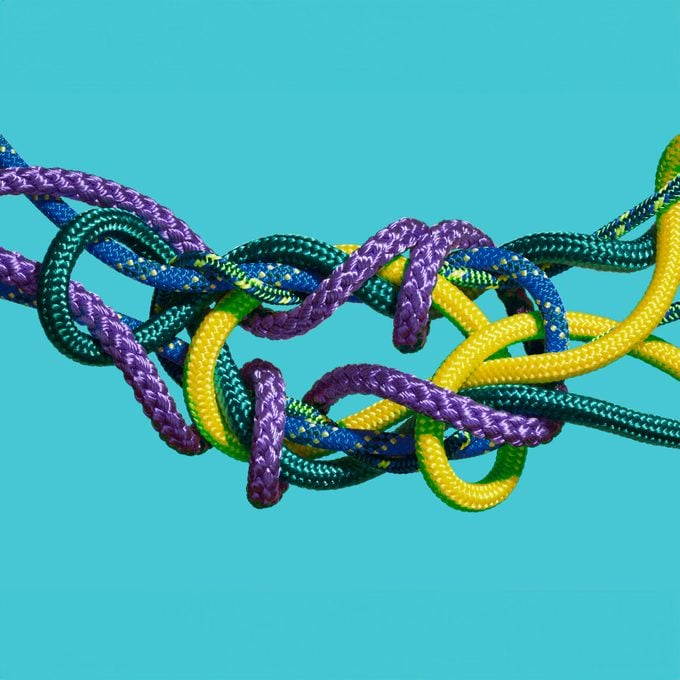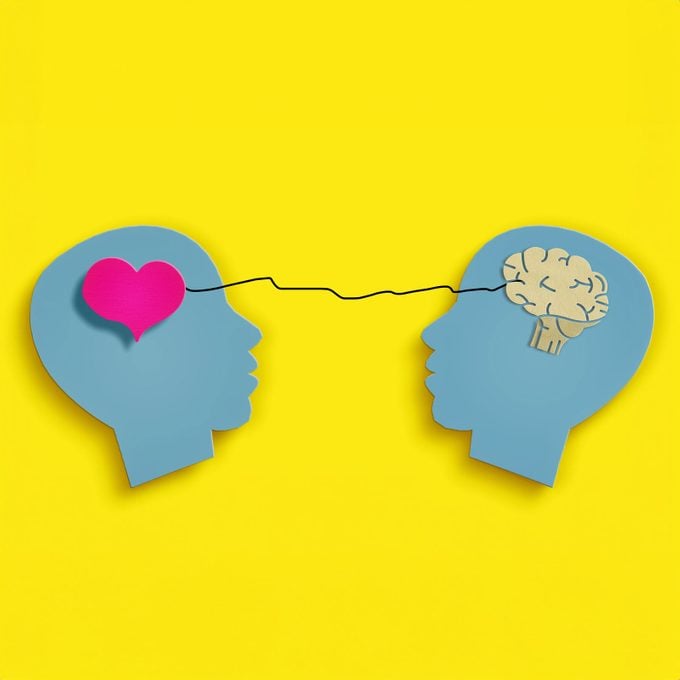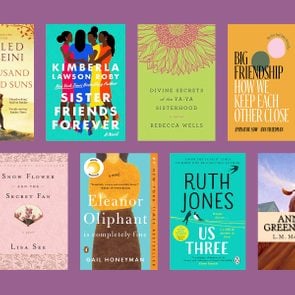How to Make Friends as an Adult—and Keep Them
Updated: Apr. 24, 2024

Everyone needs reliable friends in their inner circle. If you're in need of new pals, follow this expert advice for making friends as an adult.
Loneliness is a modern plague of epic proportions: More than half of Americans say they feel lonely, 40% say they don’t have anyone they would call a “best friend” and 12% say they have no close friends at all, according to data gathered by the Roots of Loneliness Project. The solution, however, is pretty simple—just make more friends. Oh, if only it were that easy! Learning how to make friends as an adult can feel daunting, and it’s definitely not as easy as it used to be.
But why, exactly? “As kids, we have recess and gym class. We can let our guard down,” says Marisa G. Franco, PhD, a psychology professor at the University of Maryland and the author of Platonic: How the Science of Attachment Can Help You Make—and Keep—Friends. According to sociologists, it’s those repeated, unplanned interactions and opportunities to let ourselves be vulnerable that are necessary for creating bonds that turn into friendship. For many of us, today’s work-from-home reality reduces those options significantly. A 2021 survey by the American Enterprise Institute, a public-policy think tank, found that the number of Americans who say they have no close friends has quadrupled since 1990, to one in nine.
“We’ve never been more disconnected,” says psychologist Jody Carrington, author of Feeling Seen: Reconnecting in a Disconnected World. “And the greatest predictor for overall well-being isn’t how much you drink or smoke, or what you eat. It’s social engagement.”
So how can we connect more with others in a meaningful, fulfilling way? Read on for tips from Franco, Carrington and two other relationship experts for making and deepening your friendships.
Get Reader’s Digest’s Read Up newsletter for more relationship tips, humor, cleaning, travel, tech and fun facts all week long.
About the experts
|
Why is it important to have friends as an adult?
As mentioned above, friends aren’t just fun; they’re necessary to have a long, happy and healthy life. Here are five reasons why you need friends as an adult:
- Increased social connections. That may sound obvious, but social isolation is a big deal. Research by Brigham Young University psychologist Julianne Holt-Lunstad has shown that loneliness is a major threat to longevity, reducing life expectancy by a decade—on par with smoking 15 cigarettes a day or being an alcoholic.
- Better mental and physical health. The same BYU study found that people who are lonely or socially isolated have a higher risk of impaired immune function, depression, dementia and cardiac death. Having friends reduces the risk of all these illnesses.
- Lower stress levels. When you vent about your problems to your friends or even talk about something completely different to distract yourself, it reduces your overall stress levels. And reducing stress is one of the best things you can do for your health and well-being.
- A boost in your career and relationships. Having someone to bounce ideas off and get advice about conflicts is invaluable. A good friend can help you make better decisions, thereby improving all other aspects of your life. They can help you see things in a new light, give you new information and make connections with others who can help you.
- Happiness. Having friends helps your friends and their friends be happier! Why? Happiness is contagious. A Harvard study found that when a person gets happy, their friends who live within a one-mile radius have a 25% higher chance of feeling happier too. Researchers concluded, “People’s happiness extends up to three degrees of separation—for example, to the friends of one’s friends’ friends.”
How to make friends as an adult
Now that you know just how important friendships are, you need a game plan. Though putting yourself out there to find your perfect match may feel a little awkward at times, it is completely worth it … and it’s actually not as hard as you might think. Here’s how to do it.
1. Be proactive

“Friendships don’t just happen,” says Shasta Nelson, a San Francisco–based expert on healthy relationships and the author of Frientimacy: How to Deepen Friendships for Lifelong Health and Happiness. And if they do, they might not be sustainable. A study published in the Journal of Social and Personal Relationships found that the belief that friendships were based on external or uncontrollable factors—luck, basically—predicted greater loneliness five years later.
2. Be optimistic
Optimists have an easier time making friends and forge stronger friendships, according to a University of Oregon study published in the Encyclopedia of Human Relationships. Researchers found that because optimists were more hopeful about making friends, they were less likely to get discouraged when reaching out to others and less likely to worry about how others were perceiving them—two major roadblocks many people face when starting to make adult friends. Not surprisingly, people also enjoy being around others with a positive attitude, as they are seen as being more likable—warmer, friendlier and more open.
3. Make a list

Making new friends can be tough for even the most extroverted people, but it can be harder for those on the shy side. How do introverts make friends as adults? Write down the names of three to five people you know but would like to be closer to, suggests Nelson. Then reach out to each of them: Send a text message, an invitation to meet for a cup of coffee, a shared photo or memory, or an article that made you think of them. See if a small gesture might spark a deeper connection.
4. Branch out
Don’t limit yourself to one close friend. “Nobody gives to you in all the ways you need,” says Nelson. Just a few good buddies can make all the difference. A 2020 Northern Illinois University study of middle-aged women found that those with three to five close friends had higher levels of overall satisfaction with life.
5. Expect awkwardness

Awkwardness isn’t a good reason to back out of a new relationship. “It’s a normal part of getting to know someone,” says Nelson. For example, when we go to the gym and start to sweat, she says, “we don’t panic and think, This must be bad for me. ” Recent research from the Kellogg School of Management at Northwestern University shows we tend to overestimate how awkward a first meeting will be.
Gillian Sandstrom, a psychologist at the University of Sussex, England, who researches the effects of talking to strangers, puts it in perspective: “The other person doesn’t want an awkward conversation either.”
6. Put in the time
Making a close friend takes time—often more than 200 hours of time together over several weeks, according to an oft-cited University of Kansas study from 2018. “That’s why we tell people to take a class or volunteer,” says Nelson. Repeated activities come with a built-in get-to-know-you schedule.
7. Embrace vulnerability

Vulnerability is a cornerstone of any healthy relationship. “It acknowledges that it’s OK if not everything’s great,” says Nelson. “That’s when we feel seen and known.” To start diving deeper, she suggests asking “highlight-lowlight” questions, like “What was the best part of your week?” and then “What was the most stressful?”
8. Practice
“After the pandemic, many of us forgot how to socialize,” says Franco. “Social skills are like muscles—we can work them.” In a 2022 study by Sandstrom, participants were required to talk to strangers every day for a week. And what do you know? By the end, people were less worried about being rejected and more confident they could keep the conversation going.
Why trust us
For over 100 years, Reader’s Digest has explored the nuances of relationships, working with such luminaries as Dr. Ruth Westheimer, John Gottman, PhD, and Leo Buscaglia (“Dr. Love”). We ran a decade-long relationships column and have published a compendium of features, Love and Marriage: The Reader’s Digest Guide to Intimate Relationships. For this piece on how to make friends as an adult, Caitlyn Walsh Miller researched the latest studies on friendship and spoke to four relationship experts, and then Judy Ho, PhD, a triple board-certified and licensed clinical and forensic neuropsychologist and the author of , gave it a rigorous review to ensure that all information is accurate and offers the best possible advice to readers. We support this information with credentialed experts and primary sources such as government and professional organizations, peer-reviewed journals and our writers’ personal experience where it enhances the topic. We verify all facts and data and revisit them over time to ensure they remain accurate and up to date. Read more about our team, our contributors and our editorial policies.
Sources:
- Marisa G. Franco, PhD, psychology professor at the University of Maryland and author of Platonic: How the Science of Attachment Can Help You Make—and Keep—Friends
- Jody Carrington, PhD, clinical psychologist and author of Feeling Seen: Reconnecting in a Disconnected World
- Shasta Nelson, a San Francisco–based expert on healthy relationships and the author of Frientimacy: How to Deepen Friendships for Lifelong Health and Happiness
- Gillian Sandstrom, PhD, psychologist, professor at the University of Sussex, England and head of the Sussex Centre for Research on Kindness
- Roots of Loneliness Project: “Loneliness Statistics: By Country, Demographics & More”
- PLOS Medicine: “Social Relationships and Mortality Risk: A Meta-Analytic Review”
- The BMJ: “Dynamic spread of happiness in a large social network: longitudinal analysis over 20 years in the Framingham Heart Study”
- Journal of Social and Personal Relationships: “Causal beliefs, social participation, and loneliness among older adults: A longitudinal study”
- Adultspan Journal: “Friendships, Subjective Age, and Life Satisfaction of Women in Midlife”
- Journal of Social and Personal Relationships: “How Many Hours Does It Take to Make a Friend?”




